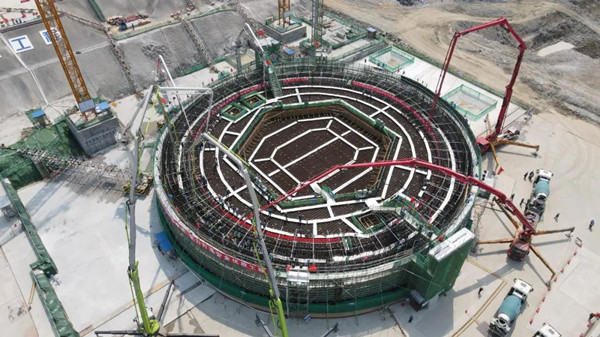Construction starts on Hualong One units in Hainan
Construction began on two Hualong One (HPR1000) units — units 3 and 4 at the Changjiang nuclear power plant in South China's Hainan province — on March 31. The project is part of a concerted plan by Hainan province, China National Nuclear Corporation (CNNC) and China Huaneng Group to realize high-quality growth. The move, which reflects China’s national strategy, will contribute to bringing carbon dioxide emissions to a peak, achieving carbon neutrality and helping to build a national pilot zone for ecological conservation and Hainan Free Trade Port. Meanwhile, nuclear energy, as a low-carbon form of energy, will play its part in helping Hainan itself realize peak carbon dioxide emissions and achieve carbon neutrality.

Units 3 and 4 at the Changjiang nuclear power plant utilize CNNC’s Hualong One technology, a third-generation pressurized water reactor with full intellectual property rights that meets the latest international nuclear safety standards. It is a major landmark achievement in the 66-year innovative development of the country’s nuclear industry, and is of great significance in terms of its leap from being a major country with nuclear power to a country with strong nuclear power technology.
With a design lifetime of 60 years, the Hualong One reactor adopts a 177-core design that replenishes fuel every 18 months. It innovatively uses a combination of "passive and active" safety systems with double containment, meeting the highest international safety standards.
To date, the world's first Hualong One unit has been put into commercial operation, the first overseas Hualong One unit has been connected to the grid, and smooth progress is being made on the other Hualong One units in construction. Each Hualong One unit generates approximately 10 billion kWh of electricity per year, meeting the annual demand of industry as well as the daily lives of 1 million local residents. This is equivalent to reducing standard coal consumption by 3.12 million tons, cutting carbon dioxide emissions by 8.16 million tons, or planting more than 70 million trees.

Units 1 and 2 at the Changjiang nuclear power plant adopt CNNC’s CNP650 pressurized water reactor, for which China holds independent intellectual property rights. Put into commercial operation in 2016, the two units generate annual electricity that accounts for one third of Hainan province’s total power supply. This is equivalent to reducing standard coal consumption by 3.07 million tons, and cutting carbon dioxide emissions by 8.04 million tons, providing safe, stable and clean electricity for the development of Hainan Free Trade Port. The two units achieved full marks in the WANO (World Association of Nuclear Operators) composite index in October 2020, indicating that they are among the world’s most advanced units in terms of their safety level.
- China Institute of Atomic Energy
- Nuclear Power Institute of China
- Southwestern Institute of Physics
- China Nuclear Power Operation Technology Corporation, Ltd.
- China Nuclear Power Engineering Co., Ltd.
- China Institute for Radiation Protection
- Beijing Research Institute of Uranium Geology (BRIUG)
- China Institute of Nuclear Industry Strategy (CINIS)
- China Nuclear Mining Science and Technology Corporation


